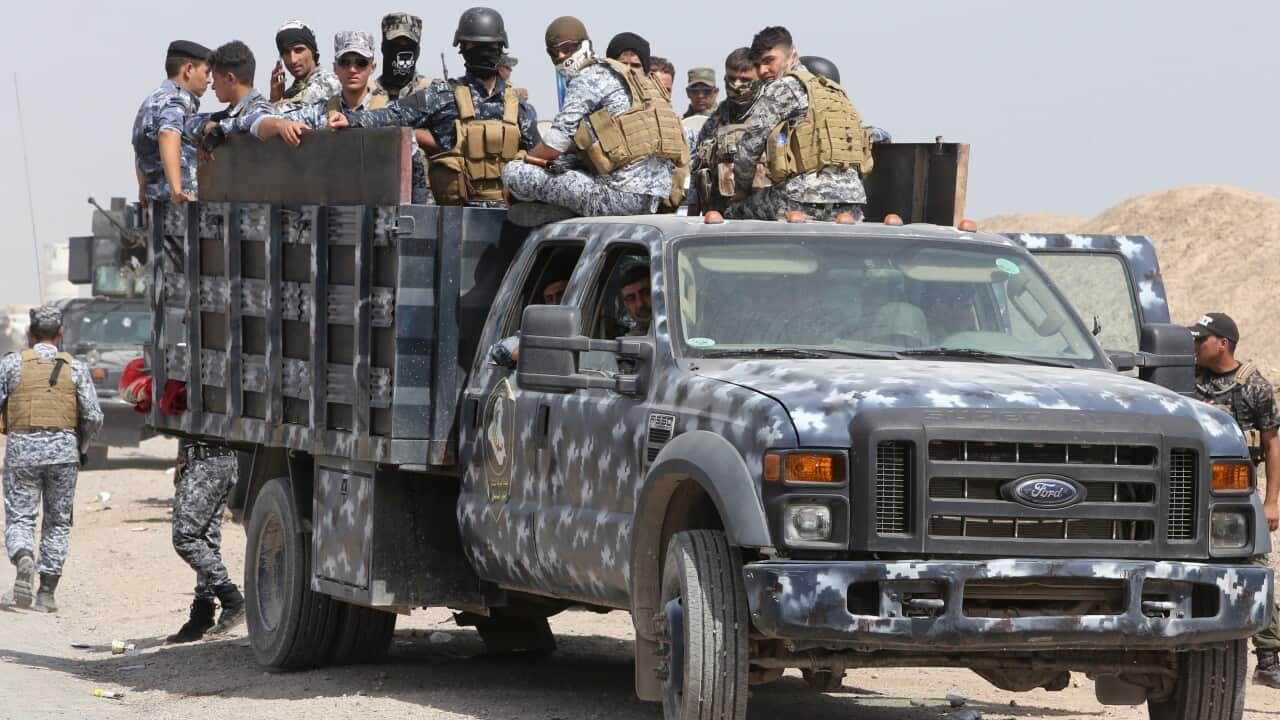Iraqi forces are preparing to launch a major effort to reclaim the city of Ramadi from the self-proclaimed Islamic State group who captured it earlier this month.
Aileen Phillips reports.
Anbar province had resisted IS assaults for more than a year, but fell after IS fighters took control of the Sunni-majority provincial capital.
Officials now say an operation has been launched to cut IS off in Anbar province, a huge area bordering Syria, before the main offensive on the city begins.
A spokesman for Iraq's Shi'ite militias, known as the Hashed al-Shaabi, Ahmed Al-Assadi announced the new operation they're calling "Labaik ya Hussein".
"The area for which the Labaik Ya Hussein operation will operate will cover the northern areas of Salahideen province and southwest Tikrit, all the way to northeast Ramadi. This is a vast area, which is thousands of square kilometres wide, and an area where ISIS is present."
The Hashed al-Shaabi is an umbrella group for mostly Shi'ite militia and volunteers, which the government called in after IS captured Ramadi in recent weeks.
The use of Shi'ite militias to try to take back the Sunni city of Ramadi from the insurgents has raised fears of sectarian bloodletting.
Iraq's Deputy Prime Minister, Saleh al-Mutlaq, says he hopes the Shi'ite militia will be able to defeat the militants without sectarianism.
"I am optimistic that Da'esh will be finished but I am worried about what comes after Da'esh. I hope that al-Hashid al-Shaabi will work in a national way which leads to Iraqi unity and not to the experiences of Salah al-Din, Diyala and Baghdad, which gave the impression that al-Hashid al-Shaabi came to these areas to change the demographics in these areas."
Iraq and the United States continue to trade verbal blows over who is to blame for the failure to maintain control of the provincial capital.
White House spokesman Josh Earnest says Iraqi troops' lack of will to fight Islamic State militants is a concern.
"That certainly has been a problem that we have seen in the past. That's what allowed ISIL to make such significant gains last summer. And so, what the United States and our coalition has been focused on is making sure that we can enhance the capacity of the Iraqi security forces in supporting the Iraqi central government as they try to unite that country and build a multi-sectarian security force to face the threat that is posed by ISIL."
His comments follow earlier remarks by the US Defence Secretary Ash Carter, who said Iraqi forces showed no will to fight against Islamic State militants during the fall of Ramadi, and US forces were trying to encourage them to engage more directly.
Meanwhile, Iraq's Deputy Prime Minister, Mr al-Mutlaq, says tens of thousands of people seeking to enter Baghdad after fleeing Ramadi must be allowed into the capital city.
The International Organisation for Migration estimates around 40,000 Iraqis have been displaced by the fighting in Ramadi, northwest of Baghdad.
Ramadi residents seeking shelter in the capital have been stranded for days, saying authorities would only allow them in if they had a sponsor in the Baghdad governorate.
Mr Mutlaq is urging security forces not to turn people away.
"My message to the security agencies who are preventing displaced people from entering Baghdad, I say to them: this behaviour is not acceptable and should not be allowed to be implemented in any way. The situation has reached a stage where we can no longer be patient when we see Iraqis dying of thirst and hunger. There are Iraqi agencies which are preventing them from entering their capital, Baghdad."
Share

